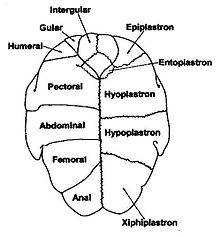Plastron (turtle)

Belly armor of an ornamental turtle ( Chrysemys picta )
The Plastron ( frs. "Chest harness ") is the flat stomach shell of the two-part tank of turtles (Testudinata). It is connected to the dorsal part of the armor, the arched back armor or carapace , via the bony “bridge” .

Horn shields ( left ) and bone plates (right) of the plastron using the example of a false pointed-headed tortoise ( Pseudemydura umbrina ).
Labeling in English
Labeling in English
The plastron and carapace each consist of an underlying layer of solid bone plates. The bone is covered by a layer of skin which - with the exception of the softshell turtles - is covered with shields (Scuta, singular Scutum = arched wooden shield of Roman legionaries) made of horny substance . However, the borders of the horn and bone plates are not congruent. According to a general scheme, the shields can be divided into groups based on their position on the plastron:
- In the middle are 6 pairs of shields, labeled from front to back:
- Gular or throat shields (Gulare)
- Humeral or arm shields (humerals)
- Pectoral or breast shields (pectorals)
- Abdominal or belly shields (abdominals)
- Femoral or thigh shield (femoral)
- Anal or anus shields (anal, syn. Subcaudale)
- There are a row of inframarginal shields on both sides of the edge
- Occasionally there is an unpaired intergular or throat shield in front
- Further scuta such as the armpit shield (axillary) and the soft or hip shield (inguinals) can occur
literature
- U. Lehmann: Paleontological dictionary. 3. Edition. Ferdinand Enke Verlag, Stuttgart 1985, ISBN 3-432-83573-6 .